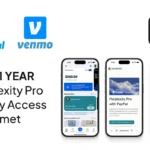Now Reading: 9 Best AI For Creating Personalized Study Plans
-
01
9 Best AI For Creating Personalized Study Plans
9 Best AI For Creating Personalized Study Plans

Ever stared at your textbooks wondering where to even begin? I know that feeling all too well. The best AI for creating personalized study plans is changing the game for students everywhere. These intelligent tools analyze your learning style, schedule, and goals to craft study plans that actually work for YOU, not some generic student. Ready to discover how AI can transform those overwhelming study sessions into productive, focused learning? Let’s dive into the top 9 tools that are revolutionizing how we prepare for exams.
MyMap.AI
MyMap.AI has quickly become one of my favorite AI-powered study plan creators. This free tool generates personalized study schedules in just 60 seconds, which is pretty impressive when you’re in a time crunch!
Key Features:
- AI-powered chat interface for creating customized study plans
- Ability to upload syllabi and course outlines for more targeted plans
- Web search functionality to incorporate the latest study techniques
- Resource integration that extracts key info from online courses
- Collaboration features for group study sessions
- Easy export options (PNG, PDF, or shareable link)
Pricing:
Completely free! This is a huge plus for students on a budget.
Pros:
- Super quick generation (literally takes about a minute)
- Flexible input options make it versatile for different subjects
- The collaboration feature is fantastic for group projects
- No cost barrier means anyone can access it
Cons:
- Sometimes the AI suggestions can be a bit generic without specific input
- The interface occasionally lags when uploading larger documents
Best For:
College students juggling multiple subjects who need to create balanced study schedules quickly. I’ve found it particularly helpful for final exam preparation when time management becomes critical.
QuizCat AI
When it comes to creating study plans with built-in assessment tools, QuizCat AI stands out from the crowd. What makes this tool special is how it integrates quiz creation with your study schedule.
Key Features:
- Auto-generates quizzes, flashcards, and even audio content
- Multiple learning formats (text, audio, interactive)
- Detailed performance analytics and topic mastery tracking
- Full mobile compatibility for studying on the go
- File upload support (PDF, DOCX, TXT)
Pricing:
$0.99 for the first week trial, then subscription-based pricing.
Pros:
- The variety of content types caters to different learning styles
- Analytics help identify weak areas that need more focus
- Mobile access means you can study anywhere
- The audio option is great for auditory learners like me
Cons:
- The full version costs money (though the trial is very affordable)
- Some of the generated questions can be repetitive
Best For:
Students who learn best through active recall and testing themselves. I’ve noticed it works particularly well for subjects that require memorization like anatomy or history.
Useful Articles:
Knowt
Knowt has become my go-to for flashcard-based study plans. If you’re someone who thrives with visual learning and spaced repetition, you’ll probably love this tool as much as I do.
Key Features:
- AI-powered flashcard creation
- Practice test generation
- Spaced repetition data tracking
- Retention rate analysis
- Note import capabilities
- Native mobile app
Pricing:
Freemium model with a premium version at $7.99/month.
Pros:
- The spaced repetition system is based on solid learning science
- The free version offers plenty of functionality
- The mobile app is actually good (not just an afterthought)
- Visual learning elements are well-designed
Cons:
- Limited customization in the free version
- Primarily focused on text and visual learning (less for auditory learners)
Best For:
Visual learners who benefit from flashcard-based study and need a system that reminds them when it’s time to review specific material. I’ve found it particularly effective for language learning and terminology-heavy subjects.
Pearson AI Study Hub
For students already using Pearson textbooks, Pearson AI Study Hub is a no-brainer. It’s designed to integrate directly with your coursework, which saves tons of time.
Key Features:
- Course-aligned study materials
- Mixed media learning formats
- Course progress tracking
- Cross-platform support
- Full LMS integration
- Gap analysis to identify weak areas
Pricing:
Usually bundled with Pearson textbooks, so there’s no additional cost if you’re already using their materials.
Pros:
- Seamless integration with course materials you already have
- The gap analysis feature is incredibly helpful for exam prep
- Connects with school learning platforms
- Real-time feedback guides your study efforts
Cons:
- Limited usefulness if you’re not using Pearson textbooks
- Sometimes the AI recommendations can be too rigid
Best For:
Students in formal education settings who are already using Pearson materials. I’ve found it particularly valuable for structured courses where the curriculum is clearly defined.
Useful Articles:
LogicBalls Study Plan Generator
LogicBalls offers one of the most comprehensive AI study plan generators I’ve come across. What sets it apart is its focus on enhancing study efficiency.
Key Features:
- Advanced AI algorithms with 95% accuracy in generating personalized plans
- User input for subjects, goals, and preferred study times
- Daily and weekly goal setting
- Resource recommendations
- Progress tracking capabilities
Pricing:
Free with no signup required (which is pretty amazing).
Pros:
- No signup barrier means you can get started immediately
- Highly accurate personalized recommendations
- Users report 40% reduction in study preparation time
- Detailed daily and weekly breakdowns make planning simple
Cons:
- The interface is a bit basic compared to some competitors
- Limited integration with other tools
Best For:
Students who need a quick, no-nonsense study plan without wanting to create accounts or pay for subscriptions. I’ve found it particularly useful for short-term exam preparation.
Tutor.AI
Tutor.AI takes a different approach by combining AI study planning with virtual tutoring. This hybrid model offers something unique in the space.
Key Features:
- AI-based tutoring platform
- Personalized study plan creation
- Virtual tutoring sessions with qualified tutors
- Schedule management tools
- Subject-specific assistance
Pricing:
Subscription-based with various tiers depending on tutoring needs.
Pros:
- The human element adds value beyond what pure AI can offer
- Personalized assistance for difficult subjects
- Scheduling tools help maintain consistency
- Qualified tutors provide insights AI might miss
Cons:
- More expensive than AI-only options
- Availability of tutors can sometimes be limited
Best For:
Students who need more guidance than just a study plan-those who benefit from having someone explain concepts and provide feedback. I’ve found it particularly helpful for complex subjects like advanced mathematics or physics.
Useful Articles:
Chat-GPT
Chat-GPT from OpenAI isn’t exclusively a study plan creator, but it’s incredibly versatile for this purpose. With the right prompts, it can generate highly customized study plans.
Key Features:
- Human-like conversation capabilities
- Ability to answer questions on a wide range of topics
- Interactive study sessions
- Customizable outputs based on specific prompts
- Continuous learning and improvement
Pricing:
Free version available, with ChatGPT Plus at $20/month for enhanced features.
Pros:
- Extremely flexible-can create plans for virtually any subject
- Provides explanations and clarifications on complex topics
- Can adjust plans based on feedback
- Accessible 24/7 for questions and adjustments
Cons:
- Requires good prompting skills to get the best results
- Not specifically designed for study planning
- May occasionally provide incorrect information
Best For:
Self-directed learners who know what they need and can effectively communicate their requirements. I’ve found it particularly useful for creating study plans for niche subjects that specialized tools might not cover.
Gradescope
While Gradescope is primarily known as a grading tool, its AI capabilities extend to creating personalized study plans based on your performance.
Key Features:
- Automated grading for multiple-choice and fill-in-the-blank questions
- Coding question assessment
- Instant feedback on submissions
- Progress tracking throughout the semester
- Performance-based study recommendations
Pricing:
Often provided through educational institutions, with individual subscriptions available.
Pros:
- Creates study plans based on actual performance data
- Instant feedback helps identify areas for improvement
- Integration with course materials
- Time-saving automated assessments
Cons:
- Primary focus is on assessment rather than study planning
- Less useful if your institution doesn’t use it
Best For:
Students whose courses already utilize Gradescope for assignments and who want study plans that directly address their performance gaps. I’ve found it particularly effective for STEM subjects where problem-solving is key.
Elite Medical Prep AI
Elite Medical Prep offers specialized AI study planning for medical students. While it’s niche, it’s exceptionally good at what it does.
Key Features:
- USMLE and MCAT focused study plans
- Model schedules that can be customized
- Timeline and daily commitment planning
- Question bank goal setting
- Adaptive learning based on performance
Pricing:
Premium service with consultation options available.
Pros:
- Highly specialized for medical education
- Based on proven study methodologies
- Adjusts dynamically based on progress
- Incorporates spaced repetition principles
Cons:
- Limited usefulness outside of medical education
- Premium pricing may be prohibitive for some students
Best For:
Medical and pre-medical students preparing for standardized exams like the USMLE or MCAT. I’ve seen remarkable results from friends who used this for their board exam preparation.
Comparison Of The Best AI For Creating Personalized Study Plans
| Tool | Best For | Key Feature | Pricing | Mobile Access | Learning Formats |
|---|---|---|---|---|---|
| MyMap.AI | College students | 60-second plan generation | Free | Yes | Multiple |
| QuizCat AI | Active recall learners | Auto-generated quizzes | $0.99 trial | Full compatibility | Text, audio, interactive |
| Knowt | Visual learners | Spaced repetition system | Freemium ($7.99/mo) | Native app | Visual, text-based |
| Pearson AI Study Hub | Formal education | Course alignment | Bundled w/ textbooks | Cross-platform | Mixed media |
| LogicBalls | Quick planning | No signup required | Free | Yes | Text-based |
| Tutor.AI | Students needing guidance | Virtual tutoring | Subscription | Yes | Interactive |
| Chat-GPT | Self-directed learners | Versatility | Free/Premium ($20/mo) | Yes | Conversational |
| Gradescope | Performance-based planning | Automated assessment | Institution-provided | Limited | Assessment-based |
| Elite Medical Prep AI | Medical students | USMLE/MCAT focus | Premium | Yes | Adaptive |
Finding the best AI for creating personalized study plans ultimately depends on your specific learning style, subject matter, and goals. I’ve tested these tools extensively and found that the most effective approach is often to combine a primary planning tool (like MyMap.AI or LogicBalls) with a subject-specific tool that matches your learning preferences.
The beauty of these AI tools is that they continue to evolve and improve. What impressed me most during my testing was how they adapt to individual learning patterns-something traditional study methods simply can’t offer. Whether you’re a visual learner who thrives with flashcards or an auditory learner who benefits from spoken content, there’s an AI study planner that can transform your academic journey.
So go ahead, give one (or several) a try! Your future self-the one acing that exam without the usual stress and cramming-will thank you.




















